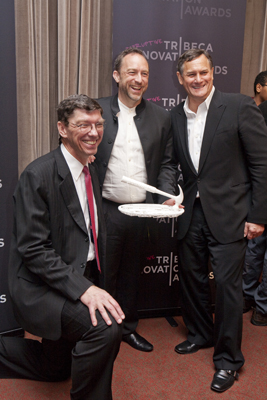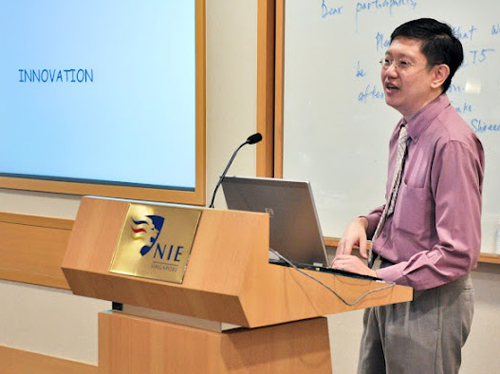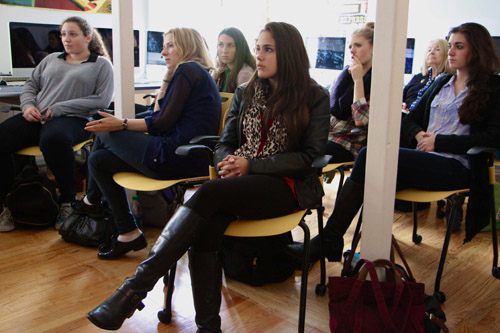
“教育創新,” 歐巴馬總統的科學卓越運動, 技術, 工程 & 數學, 是對我們的教育系統採取特定類型導向的行動呼籲. Innovation requires educators to think about a 21st century education incorporating both critical and creative thinking beginning with the earliest years of a student’s education. And why is this focus so important? Welcome to the 21st century world of disruptive innovation.
Disruptive innovation definition: A disruptive innovation is an innovation that helps create a new market and value network, and eventually goes on to disrupt an existing market and value network (over a few years or decades), displacing an earlier technology.
Following on from my interview with Dr. 托尼·瓦格納 (作者 創建創新 – 年輕人製作誰將改變世界) in the “全球搜索教育: 您的孩子是創新者嗎?“ my curiosity led me to discover further examples and perspectives of real world disruptive innovation in the fields of education and entertainment.
The Tribeca Film Festival, in association with noted Harvard Business School Professor Clay Christensen and the Disruptor Foundation, will hold the third Tribeca Disruptive Innovation Awards at NYU Stern School of Business today (四月 27). Successful disruptive innovation will be honored in the fields of culture, 教育, 衛生保健, 慈善事業, 政治, religion and social entrepreneurship. Innovation Award honorees include Jack Dorsey (Founder of Twitter and Square), John Wood (Founder of Room to Read), Daniel Kahneman (作者 思維, Fast and Slow), 賈斯汀比伯, Scooter Braun, 里克魯賓, Pat Metheny and Edward Burns.
I had the pleasure of connecting with Clay Christensen (Kim B. Clark Professor of Business Administration at the Harvard Business School, co-founder of Innosight Institute and author of the upcoming book, How Will You Measure Your Life?) and Craig Hatkoff, co-founder of one of the world’s most disruptive film festivals, namely the Tribeca Film Festival.

粘土, what is your view on the evolution of the role of technology in schools and what disruptive innovation based on technology have you seen in practice?
Schools have spent more than $60 billion over the last two decades placing computers in schools. But the traditional instruction style for all students still typifies the system. That’s because schools have done what all organizations are inclined to do when incorporating new technology. They cram the technology into their existing structure. And very little changes. But online learning is entering the system more disruptively, in a way that could eventually disrupt the classroom. We’re seeing it take root in areas of nonconsumption, meaning instances where the alternative is nothing. These include places like dropout recovery, credit recovery, advanced placement courses, and home schooling. As it gets it footing there, online learning stands a much better chance to improve over time and eventually become good enough to offer a competitive value proposition even for mainstream students. 這時候,教室系統將真正改變. Parents will start demanding it.
克雷格, what is one of the more significant disruptive innovations that you have seen come out of the living laboratory provided by Tribeca?
There are many examples but one of my favorites is the move from the once traditional model of film distribution, 即. the theatrical release/home video/ pay TV cycle, to a series of new distribution models, driven by various developments in technology and new enterprises that have made use of them.
In the new model, we have been able to change film release windows by creating a video on demand/iTunes/Netflix, 等. ecosystem (including festival day and date releases) as well as an online Tribeca Film Festival. We are now in 40 million homes year-round. Netflix and iTunes have also become significant factors. While the when-I-want where-I-want model may not be a perfect substitute experience for a sophisticated festival junkie, it is pretty clearly finding a new market. Plus it is good enough for markets across the country that don’t have access to their own film festival. You can only sell so many tickets over 12 days at the festival, but to reach 40 million homes on film distribution even if outside the actual dates of the festival is a pretty big innovation for a film festival. More and more filmmakers are becoming receptive to this type of film distribution. Tribeca has even set up our own distribution company that buys films out of the festival just like other distributors. For now we are focusing on the smaller budget films because that is where the need is and the festival platform itself gives us a competitive advantage.

粘土, what programs or ideas entailing disruptive innovation are you aware of that have had or you believe will have a significant impact on the education achievement gap?
In the past only the privileged had access to computers. In fact the first computers, the mainframes, cost upwards of $2 百萬, so they were clearly out of reach. But through the process of disruptive innovation along came minicomputers, then personal computers, and now tablets and smartphones. That’s the force of disruptive innovation, and it is closing the achievement gap on an international level. Children in India only need handhelds to access the world’s most advanced courses. In the history of access to knowledge, we’re at an inflection point that is rivaled only by innovations like the printing press. Online learning may not close America’s achievement gap, 但, because it might accelerate kids at the top as fast as kids at the bottom. So the population as a whole advances, but the gap doesn’t narrow. The reason why is that evidence is now emerging that online learners outperform traditional learning with many students and in many fields. The technology can be tailored to each student’s learning style. It also can be structured to help each student feel success every day.
克雷格, the Tribeca Film Festival has been a disruptive innovation. What have been the key elements of this phenomenon and who have been the primary beneficiaries?
The Tribeca Film festival itself was started in 2002, right around the time I was spending time with Clay Christensen who created the disruptive innovation theory. I saw the opportunity to use Clay’s framework of simpler, more accessible products that got the job done. Our film festival had many jobs to do. We wanted to connect filmmakers with new audiences. We wanted to bring people back to the streets of Lower Manhattan. We had to keep the film purists satisfied. At first they did not understand the mission, voice or identity of the Tribeca Film festival. We wanted something for everyone, lots of free large-scale public events, and everyone to feel invited and to participate. I took great joy in disregarding purported rules of what a film festival is supposed to be. We reinvented the notion of a film festival and we were disruptive mainly out of necessity. Lower Manhattan was still in shambles because of 9/11 for our first two festivals. We had to be inventive relying on non-traditional venues, so we set up a drive-in on the west side highway where we even screened the final episode of Friends— that was pretty radical. The drive-in is now an annual event at the North Cove at Battery Park City.
As to who has benefited, I think this has been a win-win-win. The filmmakers have benefitted, the audiences old and new have had more access to independent films, and clearly Lower Manhattan has seen the rebirth that was the initial mission of the festival.
欲了解更多信息: www.tribecafilm.com/disruptive

Photos courtesy of Stern + Associates and Tribeca Film Festival.
在全球搜索教育, 和我一樣,全球知名的思想領袖,包括邁克爾·巴伯爵士 (英國), 博士. 邁克爾座 (美國), 博士. 萊昂特司特因 (美國), 博士. 琳達·達林 - 哈蒙德 (美國), 博士. 馬達夫恰範 (印度), 邁克爾·富蘭教授 (加拿大), 霍華德·加德納教授 (美國), 伊馮娜赫爾曼教授 (荷蘭), 克里斯汀Helstad教授 (挪威), 讓·亨德里克森 (美國), 玫瑰Hipkins教授 (新西蘭), 科妮莉亞Hoogland教授 (加拿大), 太太. 尚塔爾考夫曼 (比利時), 博士. Eija Kauppinen (芬蘭), 國務秘書塔皮奧Kosunen (芬蘭), 多米尼克·拉方丹教授 (比利時), 休·勞德教授 (英國), 本·萊文教授 (加拿大), 巴里McGaw教授 (澳大利亞), 希夫納達爾 (印度), Ř教授. 納塔拉詹 (印度), 博士. 丹尼斯教皇 (美國), 斯瑞達拉賈戈帕蘭 (印度), 博士. 黛安·拉維奇 (美國), 肯·羅賓遜爵士 (英國), 帕西SAHLBERG教授 (芬蘭), 安德烈亞斯·施萊歇 (PISA, 經合組織), 博士. 安東尼·塞爾頓 (英國), 博士. 大衛·謝弗 (美國), 博士. 基爾斯滕都沉浸式 (挪威), 總理斯蒂芬·SPAHN (美國), 伊夫Theze (法國公立高中美國), 查爾斯Ungerleider教授 (加拿大), 托尼·瓦格納教授 (美國), 大衛·沃森爵士 (英國), 迪倫Wiliam教授 (英國), 博士. 馬克沃莫爾德 (英國), 西奧Wubbels教授 (荷蘭), 邁克爾·楊教授 (英國), 和張民選教授 (中國) 因為他們探索所有國家今天面臨的大畫面的教育問題. 全球搜索教育社區頁面
ç. M. 魯賓是兩個廣為傳誦的在線系列,她接受了筆者 2011 厄普頓·辛克萊獎, “全球搜索教育” 和 “我們將如何閱讀?” 她也是三本暢銷書, 其中 真正的愛麗絲夢遊仙境.
按照ç. M. 魯賓在Twitter: www.twitter.com/@cmrubinworld





最新評論